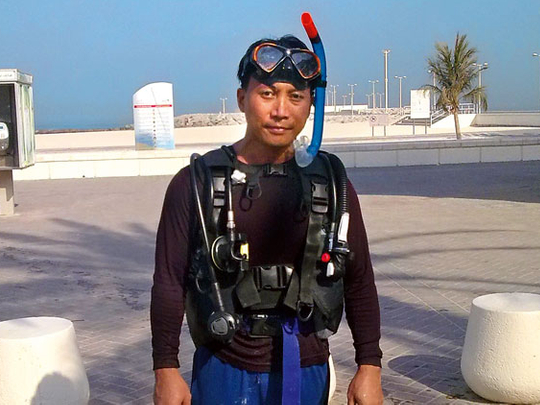
“It was just enthralling,’’ says Manuel Lara Gr recalling the time he encountered a stingray the size of a garden table.
A Filipino from a small village called Ilo Ilo, this Dubai-based expat, a lifeguard, cannot forget that moment.
“For me, deep sea diving is something I truly enjoy. When I am underwater, I revel in the magical world below the water and feel like spending all my life there,’’ he says.
He encountered the stingray while swimming in the Philippines. “It was lying sluggishly on an underwater rock.’’
For a moment he was nonplussed. “But when it sensed human presence, it just glided away gracefully.
“I remember my trainer once telling me about a death that occurred in Australia when the sting penetrated the victim’s vital organ.” (Manuel was referring to Steve Irwin, the wildlife
expert and documentary producer who was killed while diving off the coast of Australia.)
“I did not try to invade its space,’’ says Manuel. “These are not endangered species but have been classified as vulnerable. These are actually docile and intelligent creatures. They never attack aggressively.
“I believe that if you treat animals with respect, do not encroach on their privacy and recognise the fact that they are wild and free, they will not harm you.’’
Stingrays are not the only dangerous marine creatures that he has come face to face with. Manuel remembers sighting a shark that left him with “a unique and memorable
experience”.
“The shark was small and the sighting was a rare treat. Though humans are seldom on a sharks’ menu, among the 300 species of shark, there are three varieties known to attack humans – the bull, tiger and white shark.
“The best precaution against shark attacks is of course, to avoid shark-infested water or exit waters as soon as you spot one.
“One should not take warnings lightly. Avoid swimming in areas of fishing activity, steep drop-offs and swimming alone. Sharks over 180cm can be dangerous. One has to be aware of threatening behaviour like when it swims fast or in a zigzag motion. One of the best strategies is to wear dull swimwear, avoid wearing jewellery or exposing uneven tanning. Also, it is important that you stay out of water in case of bleeding due to an injury.”
Manuel arrived in Dubai in 2005 in search of a job. Thanks to his swimming prowess, he soon got a job as a lifeguard. Keen to learn more about the marine world, he is undergoing training in deep sea diving. Saving lives is just one part of his job and he feels lucky that he has been able to help people.
He remembers rescuing a two-year-old child who was on the verge of drowning. His training helped him react instantly and perform his duty without panicking. Not everyone who knows swimming can react in that instant. He says that appropriate reaction to drowning episode comes with training.
“It is important to be well equipped when trying to save a drowning individual. Floaters and ropes are important items for a lifeguard. A drowning person is likely to push or pull at the rescuer and being a good swimmer alone is not enough.” Manuel adds, “I learnt to swim all by myself in the village along with a friend. We would use banana plants as floaters. It was great fun. I have a 14-year-old son back home who is quite a good swimmer.’’
One of his dreams is to teach children the art of swimming. “There is nothing more thrilling than the feel of ruling the water.”
Interview by Minakhee Mishra, Dubai-based freelancer











